Your hot tub is supposed to provide a comfortable, relaxing, and healthy experience. But how can your mind be at ease if you’re worried about chemicals or germs in your hot tub? Have a look at the solutions that can help keep the hot tub water clean and safe without the use of harsh chemicals.
| Chemical-free solution | Product | Reducing the need for chemicals (chlorine/bromine) | Price range |
| Draining (change the water every time) |  | 100% | Price range $-$$$ (depends on how much water you are using) |
| Ozonation (ozone is a very powerful oxidizer) |  | 50-75% | Price range $ |
| Ionization (metallic ions are used to help to sanitize water) |  | 50-75% | Price range $$ |
| Saltwater (produces natural chlorine/bromine from salt) |  | 100% | Price range $$ |
Read more to figure out how it works and to understand what is the best choice for you.
Key Points
- You can soak in tap water absolutely chemical-free, but you have to drain your hot tub every time. This is in practice only possible for the small hot tubs — like Aqua Rest 300. And there are some other issues with this method.
- You can get as close to tap water as possible with Saltwater tubs; UV, Ionators, etc, or a combination of all these devices.
- It’s important to know that chemical-free water, if not disinfected properly, is MUCH MORE DANGEROUS than even water that is heavily infused with chemicals.
Why people go chemical-free
There are a number of reasons to go chemical-free with hot tubs:
- health concerns (such as pregnancy, effects on small children, etc.)
- allergic to some chemicals
- sensitive skin
- hate the odor
- want to be eco-friendly
- want to save money
- just don’t want chemicals
Below, I review each group of hot tub users and explain the most suitable chemical-free solution for you.
Warning: if your skin is irritated by a hot tub, it could be due to low or imbalanced chemicals, rather than a high concentration. This is because the wrong balance, or the wrong concentration, can result in water becoming contaminated. If you get a red rash after using your hot tub, for example, you might naturally think it’s because of the chemicals – in fact, the rash could well be caused by bacteria which weren’t eliminated in the water. If you have any skin irritation, consult with your doctor and test your water quality.
How bad are chemicals for your health?
All water have chemicals
| Indicator | Distilled | Drinking/tap | Ordinary hot tub | UV, ionator+etc hot tub | Ozone | Pool water | Salt hot | Seawater |
| Free chlorine | 0 | up to 3 ppm | 3 ppm | 1-2 ppm | 0,5 ppm | 1-3 ppm | 1-3 ppm | up to 20 000 ppm |
| NaCl | 0 | 100-500 ppm | 100-500 ppm | 100-500 ppm | 100-500ppm | 100-500 ppm | 2500 ppm | 35000 ppm |
| pH | 7 | 6,5-8,5 | 7,2-7,8 | 7,2-7,8 | 7,2-7,8 | 7,2-7,8 | 7,2-7,8 | 7.5 - 8.4 |
How do chemicals affect your health?
In reality, water that is contaminated by bacteria is MUCH MORE DANGEROUS than the standard chemicals used to treat water. These bacteria, when not eliminated, can lead to multiple diseases, ranging from hot tub rash to pneumonia and even STDs. There are hot tub types where the concentration of chemicals is close to the concentration of chemicals in tap water. When alkalinity and pH level is balanced, chemicals will do their work well so you won’t need to add more in order to properly disinfect your water.
- Chlorine/bromine — strong sanitizers and could be dangerous for health, but only if the concentration is over safe limits (> 3ppm). So it’s important to control test the water.
- pH/alkalinity controls — this involves balancing the hot tub’s water so the sanitizers work effectively. High or low pH levels have bad effects on the water in your hot tub, but this chemical on its own is safe for health since it’s based on baking soda and muriatic acid, both of which are widely used in food products.
How does a lack of chemicals impact on your health?
If you don’t use enough chemicals, hot tub water becomes unbalanced and poorly disinfected. Water that’s insufficiently treated contains a lot of bacteria, some of which may be harmful and could cause infection and disease. These bacteria can enter your body through the skin, eyes or nose while you’re soaking. The most dangerous bacteria are Cryptosporidium (a parasite), Legionella (this causes pneumonia) and Pseudomonas (causes hot tub folliculitis). The bacteria are difficult to kill even with chlorine shock and ozone, so you need to ensure that all filters and pumps are properly maintained. You should also always shower before soaking and, if you are unwell, don’t use the hot tub at all since you might contaminate the water. You should monitor your tub’s water quality using one of the methods listed below.
Ways to go (almost) chemical-free
All water have chemicals. Tapwater, drinking water, and seawater already have chlorine. So even if you choose a chemical-free hot tub, you’ll need to install a filter to get rid of most chemicals. With chemical-free solutions for hot tubs, you can reduce the amount of chemicals to reach the needed concentration of 1-3 ppm (that’s safe), while some of these methods even allow you to reduce the needed concentration to 0.5 ppm (that’s safe enough). It’s important to understand, though, that these chemicals only cause harm if their concentration levels are too low or too high. Once you get it right, your hot tub water won’t differ a lot from tap water.
There’s only one method that lets you go 100% chemical-free — draining. The other solutions reduce the use of chemicals to close to what’s normal even for tap water.
Method Fir for Eco-friendly Cost Chlorine/bromine reducement
allergic pregnant kids
Draining if there is no allergen in initial water except 1st trimester, t < 102*F (38,9*C) age > 5 years no $$ fully
UV light if there is no allergen in initial water except 1st trimester, t < 102*F (38,9*C) age > 5 years yes $ x2
Ozonation if there is no allergen in initial water except 1st trimester, t < 102*F (38,9*C) age > 5 years yes $$ x2-3
Ionization if there is no allergen in initial water except 1st trimester, t < 102*F (38,9*C) age > 5 years yes $$$ x2-3
Saltwater if there is no allergen in initial water except 1st trimester, t < 102*F (38,9*C) age > 5 years yes $$ produces natural chlorine/bromine
Draining every time
Pros: allows you to avoid using any chemicals
Cons: long to heat, not eco-friendly.
Average cost: $1-2/refill + extra electricity usage for heating
| Model | Capacity, gal | Approx time to heat, h |
| Aqua Rest 300, 2 person | 160 | 18-24 |
| QCA Spas Model 0H SM Sirius, 2-Person | 190 | 24-30 |
| Essential Hot Tubs 11-Jet, 4-5 persons | 241 | 20-30 |
| Essential Hot Tubs 20-Jet, 5-7 persons | 250 | 25-35 |
UV light
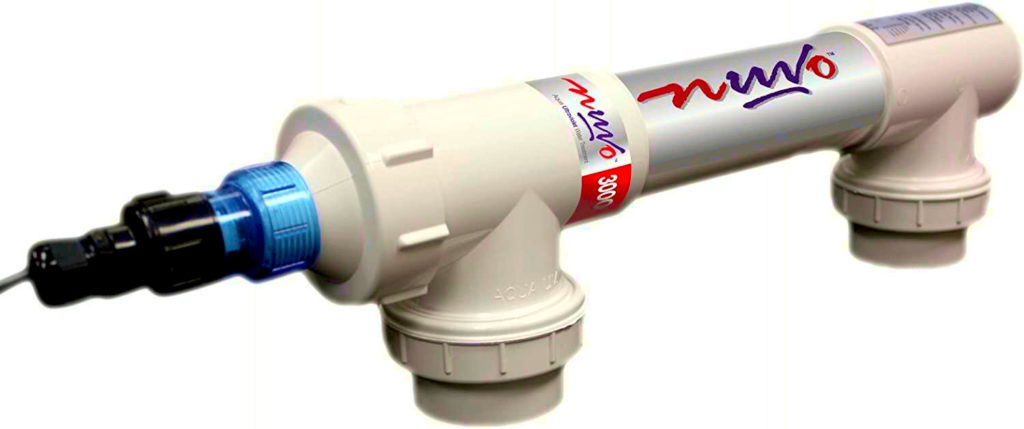
Solaxx UV1500A 35 GPM Nuvo Ultraviolet Water Sterilizer
This device is installed in the pipe of the hot tub’s circulation system. UV light bombards passing water with germicidal ultraviolet rays and destroys pathogens.
Pros: effectively destroys microorganisms, easy installation
Cons: you don’t avoid using chlorine/bromine, which is still required, but х2 times less.
Average cost: $300-400, only once.
Ozonators

UltraPure Ozonator, EUV3, UV, 115v/230v, AMP Cord
Ozone is a very powerful oxidizing agent and natural sanitizer. It can quickly and effectively kill most bacteria and microorganisms in your tub. A hot tub Ozonator is a device that produces ozone gas and injects it into the spa water. Ozone can be produced by ultraviolet light (UV Ozonator) or by corona discharge (CD Ozonator). It won’t replace the use of chemical sanitizers, but it does reduce the needed amount by 50% to 80%.
Pros: low price, 2-3 times reduce using of chemicals, no odor.
Cons: need to check ozone with test strips to make sure it works, not easy to install, must run for at least 4 hours per day, ozonated water causes corrosion, lasts two to three years.
Average cost: $100-500, once.
Ionizers
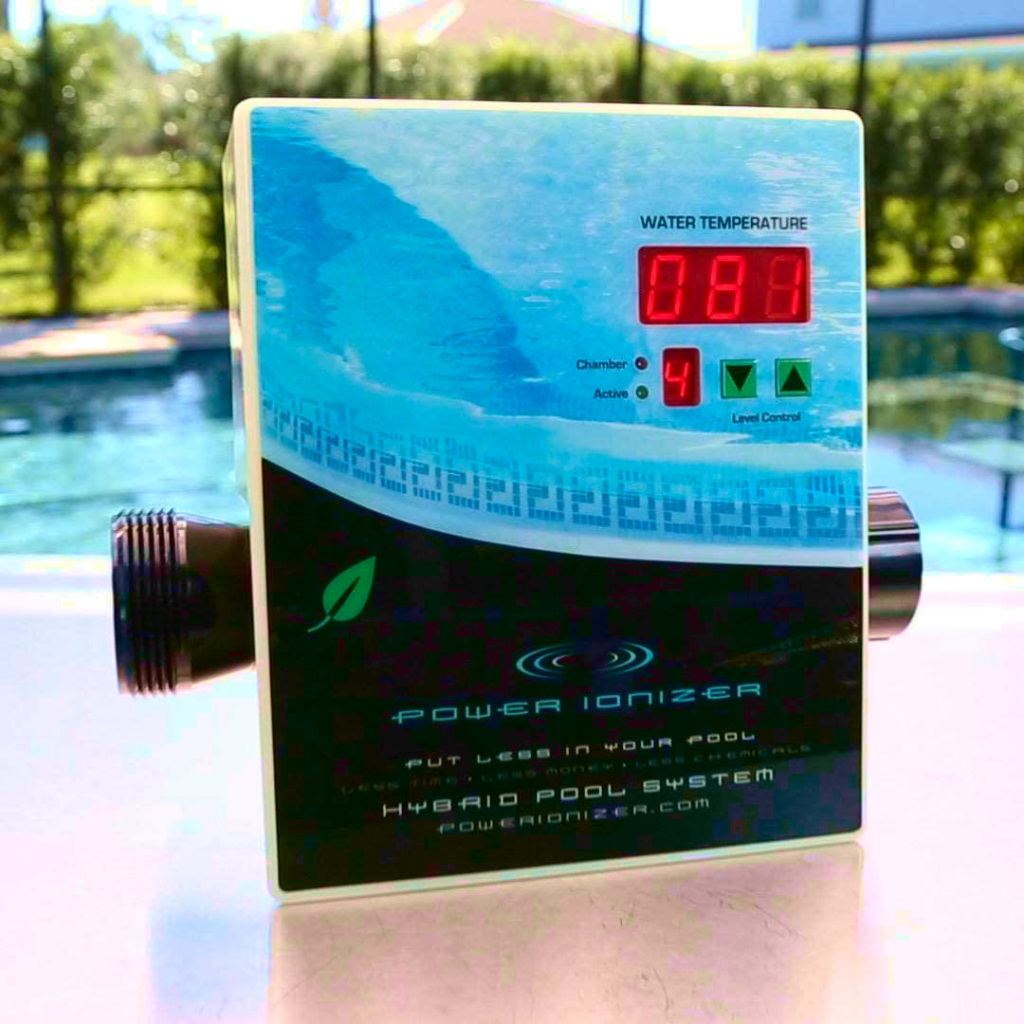
Ionization is the process whereby metallic ions (copper, silver, zinc) are used to help to sanitize hot tub water. However, ionization isn’t enough for complete water purifying, as it doesn’t have an oxidizing effect. So you still have to use chlorine/bromine.
Pros: reduces using chlorine/bromine two to three times less than usual, no odor, non-corrosive, easy installation.
Cons: not a single solution, need to control cooper level with tests, high price.
Average cost: $300-800, once.
Salt-water
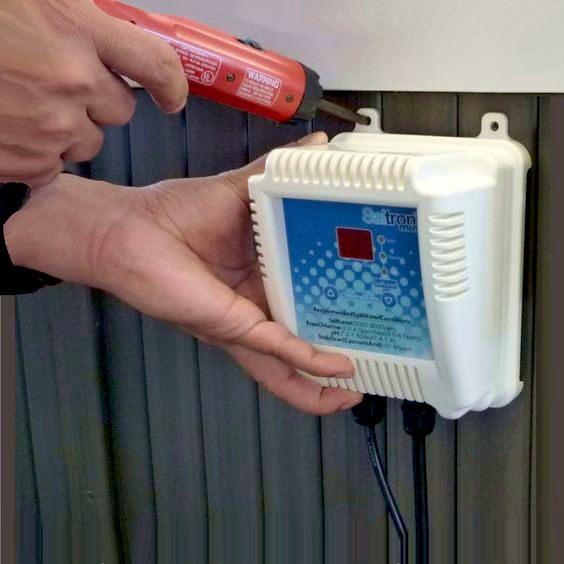
Source: Pinterest
Every hot tub can be converted into saltwater by the addition of a salt-chlorine/bromine generator. You should add salt, which dissolves and produces natural chlorine/bromine that is needed to keep your hot tub clean. Using NaBr has an advantage because it can stay potent in high temperatures. But it is twice as expensive as NaCl, so saltwater chlorinators are more common.
Pros: soft water, no need for sanitizer, no odor.
Cons: risk of corrosion, salt cells last 2-5 years, used in warm water only.
Average cost: $200-300 chlorine generator, $400-500 bromine generator, once.
Suitable solutions for different groups of people
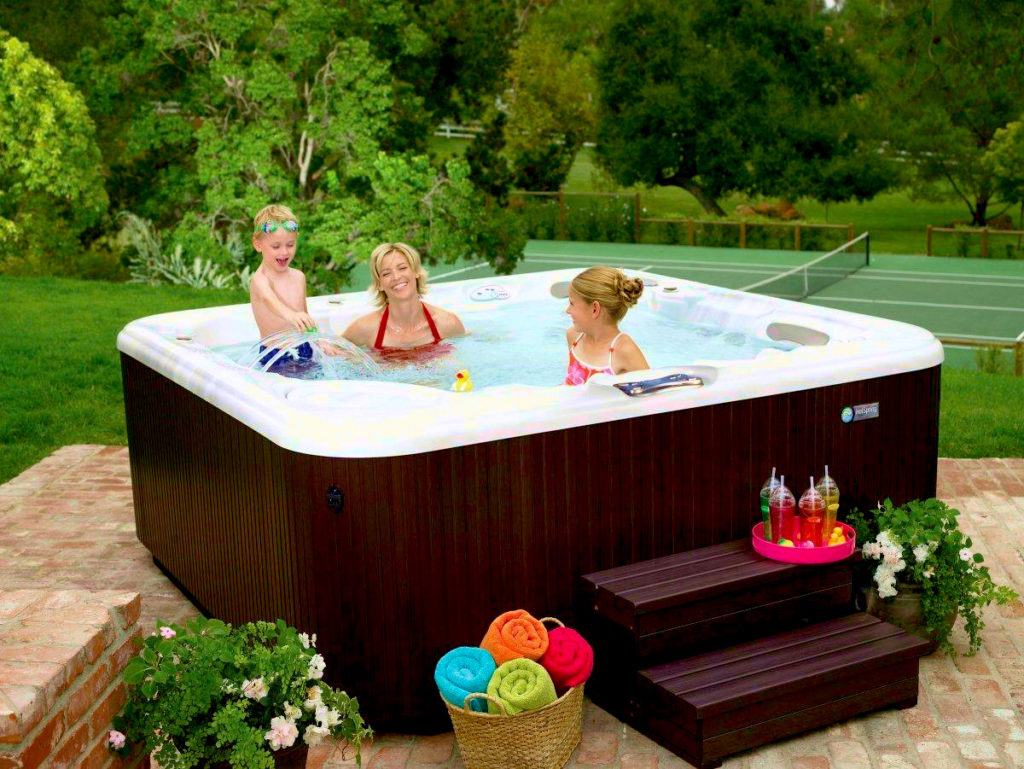
Hot Tub Chemicals and Pregnancy/Kids
Acceptable hot tub methods: Standard hot tub chemical concentration is safe but, if you still prefer to decrease the amount of chemicals, any of the methods listed are effective.
Limitations:
- t < 102*F (hot tubs for pregnant women)
- not allowed during first trimester of pregnancy
- not allowed for kids under 5 years old
- limit tub session max to 10min
- don’t handle chemicals yourself
- avoid contaminated water, keep chemicals in the normal concentration
Note that the most dangerous factor for a pregnant woman is NOT chemicals but TEMPERATURE. It’s therefore important to use a hot tub thermometer for every bath session.
Chemicals and Allergy
Acceptable hot tub methods: This depends on what chemical triggers sensitivity. Only draining excludes all chemicals. If you are allergic to Chlorine, change it to Bromine and vice versa. If you aren’t sure what an allergen is, consult your doctor to determine and correct the water’s chemicals.
Sensitive skin
Acceptable hot tub methods: Ozonators, UV, Mineral ionizers, Saltwater, non-chlorine oxidizer, draining.
Common causes of skin irritation are Chlorine and Bromine and you should avoid using them, change filters on time, and drain the hot tub more frequently.
Limitations: Make sure your water is balanced, since irritation could be caused by bacteria rather than chemicals!
Chemical odor
Acceptable hot tub methods: Bromine, Ozonators, UV, Mineral ionizers, Saltwater, non-chlorine oxidizer, draining.
Chlorine and Bromine have a chemical smell, but Bromine has a milder odor. If you can’t tolerate chemical odors at all, use the other methods listed above.
Limitations: if you have a strong chlorine smell, it probably means you don’t have enough chlorine in your water. This seems paradoxical but the smell isn’t caused by chlorine, but chloramines, and it means that there is a lot of contamination in the water and the chlorine amount isn’t concentrated enough to remove it. If the water is balanced, there will be only a slight odor of chlorine.
Eco-friendly
Acceptable hot tub methods: Ozonators, UV, Mineral ionizers, Saltwater, non-chlorine oxidizer
Eco-friendly hot tubing avoids using chemicals and saves water. You will lower your use of chemicals and change the water less frequently.
Limitations: Make sure your water is purified enough, test water quality.
Saving money
Acceptable hot tub methods: All methods except draining every time.
You can save money on the annual amount of chemicals but you should consider an initial cost of alternative devices like Saltwater systems, UV, Ozonators, Ionizers, etc.
Limitations: You need to keep track of how long the devices last and how frequently they should be replaced.
Just don’t want chemicals:)
Acceptable hot tub methods: Draining every time is the ONLY way.
If you don’t have any healthy restrictions, you should weigh the pros and cons and decide if you really need it and why.
Whichever method you choose, it’ll work best if you change and clean the hot tub filters regularly.
A hot tub filter is one more device that is helps keep water clean.
A good quality filter will last two to three years, depending on the type of used water and how often you soak. The filter should be replaced according to the manufacturer’s instructions or if it changes color or gets damaged while cleaning.
Cleaning the filter prolongs its lifetime and can be done with tap water or special liquids or sprays for hot tub filters.
Check water quality

Source: poolserviceinriverside.com
Not all contaminants in hot tub water are visible to the naked eye. Testing allows you to evaluate whether the water in your hot tub balanced or not. Keeping this balance is necessary because it shows how effectively purified the water is. Of course, if you don’t use chemicals, you need to control the quality of water even more than usual.
We strongly recommend you check these parameters regularly:
- Total Alkalinity — controls pH level, keep it 80-120 ppm
- pH — acidic/alkaline indicator, keep it 7.2-7.8 ppm
- Bromine — if used, an indicator of disinfection efficiency keep it 4-6 ppm
- Free Chlorine — an indicator of disinfection efficiency keep it 1-3 ppm
- Calcium Hardness — an indicator of water corrosive properties, 80-200 ppm
- Total Dissolved Solids — indicates if you need to refill the water, it should not be more than 1,500 mg/l.
- Ozone — if used, indicates if Ozone is produced effectively, keep it in the range 1.2-1.5mg/L.
How to & How often
used for pH, Alkalinity, Chlorine/Bromine;
pH — every day, others — weekly.
used for test Chlorine, Bromine, pH, Acid Demand, and Alkalinity;
pH — every day, others — weekly.
used for test chlorine and bromine, pH, TDS (Total Dissolved Solids), Alkalinity, Calcium hardness;
pH — every day, alkalinity — weekly, others — monthly.
24/7 monitoring spa water, informs when do you need to adjust, has a smartphone application for quick notifications.
Q&A
Can you go 100% chemical-free?
Yes, you can have absolutely zero chemicals. There are some serious limitations to that method, though.
If I am allergic to public pools can it be the same in my ht?
Depending on what are you allergic to, since it may be chemicals or bacteria.
Are wooden hot tubs chemical-free?
Not exactly. Wooden hot tubs require the same treatment as ordinary. Nonetheless, the body of a wooden hot tub is natural so, in that sense, they are chemical-free.
Are saltwater hot tubs chemical-free?
Not exactly. Saltwater system reduces the amount of chemicals, but these tubs still need treatment.
Can pregnant women do hot-tubbing?
Yes, pregnant women can soak in the hot tub, but there are strong restrictions.
Is the chemical-free treatment more expensive than traditional?
It depends on what method do you prefer. Some of them have a high initial cost, but reduce expenses on chemicals by lowering the amount used over time.
How frequently should you change the water in the hot tub?
Usually, you should change the water in the hot tub every three to four months, but it depends on your usage style. So test your water to be sure.
Summary
The water in your hot tub is like an ecosystem, because it is used for many times and for a long time (up to three to four months or even a whole year). So, if you don’t want any pathogens and harmful microbes to live there, you do need to purify it. Or you can change it every time and you’ll get a really chemical free hot tub! But this method has significant restrictions and will not suit everyone.
Solutions like Saltwater systems, UV, Ozonators, Ionizers, etc. allow you to reduce chemicals usage by two to three times. Common hot tub chemicals such as chlorine/bromine may impact badly on your health, but only if the concentration is out of limits. If the concentration is balanced properly, your water will no different than tap water. Choose the purifying method according to your requirements and you can be sure that soaking in a hot tub is safe. Then you can enjoy total peace of mind as well as a relaxed body!
FAQ
👌Can you have a 100% chemical-free hot tub?
Yes, you can have zero chemicals if you drain your spa every time. However, there are some limitations to this method that we have described in our article.
👆What are chemical-free hot tub solutions?
💰Is chemical-free hot tub treatment more expensive than traditional treatment?
It depends on the method that you prefer. Some of the methods have a high initial cost, but you can reduce the expenses spent on chemicals by gradually reducing the number of chemicals.
🧂Are saltwater hot tubs chemical-free?
Not exactly. Saltwater systems only reduce the number of chemicals, they still need treatment.
❓Are wooden hot tubs chemical-free?
Not exactly. Just like traditional hot tubs, wooden hot tubs require treatment too. Nonetheless, a wooden hot tub has a natural body and that makes it chemical-free. In the wooden tub manufacturing process, no harmful chemicals are released into the environment.


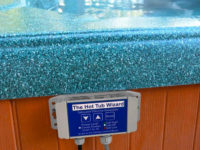
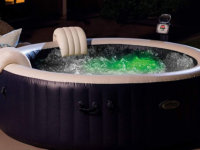
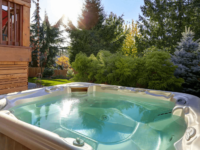
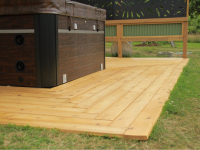
What do I do if the test strips say my free chlorine is too high?